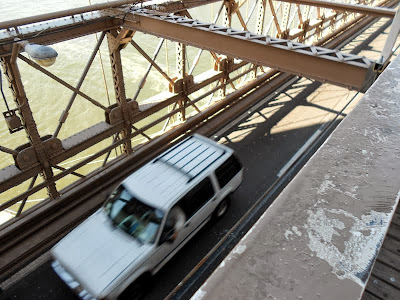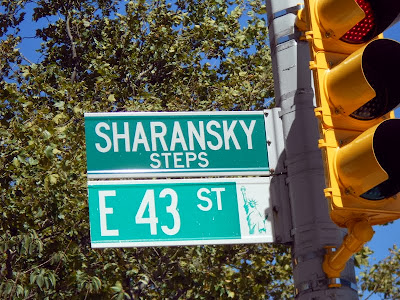The Brooklyn Bridge
'....a shrine containing all the efforts of the new civilisation of America' (Joseph Stella, Italian immigrant painter).
One of several spans across the East River, the Brooklyn Bridge is today somewhat dwarfed by the lower Manhattan skyscrapers, but for twenty years after its opening in 1883 it was the world's largest and longest suspension bridge and - for many more years - the longest single-span structure.
Crucially, it expanded the scope of New York City, paving the way for the incorporation of the outer boroughs and the creation of a true metropolis.
Its construction was not without difficulties:
- early in the project, architect and engineer John Augustus Roebling crushed his foot taking measurements for the pier and died of tetanus less than 3 weeks later
- his son Washington took over, only to be crippled by the bends after working in an insecure underwater caisson: he subsequently directed the work from his sickbed overlooking the site
- twenty workers died during the construction
- a week after the opening day, twelve people were crushed to death in a panicked rush on the bridge's footpath (mercifully, no panic on the day we crossed by the same footpath).
You can safely walk along the bridge on the walkway above the cars, so on Thursday morning we set off.
One of the first things you see is Pier 17, where we visited on our first evening in New York.
.....and the constant rumble of vehicles is a reminder of what's below you. But you do need a strong stomach to look down..
Once we got about midway, we looked back at the giants of the Financial District behind the spidery latticework of cables.
 |
| The Empire State Building |
 |
| Chris was convinced this one had been designed by the same architect as was responsible for a very similar building in Dusseldorf, near the E-on building he used to work in. |
 |
| And, of course, that statue again! |
We could have got off the bridge at Downtown Brooklyn but we had decided against it as we had more to see and do in Manhattan, so we retraced our steps across the bridge.
The United Nations
After 1945, New York was the obvious choice as the permanent home of the newly-created United Nations Organisation. Lured by John D. Rockefeller's $8.5 million donation that bought land on the east side of Manhattan, construction started in 1947 and wasn't completed until 1963. The end result is the product of a suitably international team of architects, including Le Corbusier (though he pulled out before the work was completed).
The decision to build here was clearly of lasting political significance but, despite the symbolism of the UN, the building and site are unfortunately all- too- obviously the result of 'architectural design by international committee', and inordinately dull and uninspiring architecturally.
 |
| Bikes at the ready for departing Assembly and Security Council members? |
The Chrysler Building
If the UN was disappointing, it did at least afford a splendid view of the Chrysler Building. Dating from 1930, for a matter of months it was the world's tallest building until surpassed by the Empire State Building in 1931. The building's car-motif friezes, hood- ornament gargoyles, radiator-grille spire, and the fact that the entire building is almost completely fashioned from stainless steel, evokes the golden age of motoring (the Chrysler Corporation moved out decades ago).
There's a delicious story of how its designer, William Van Alen, indulged in a feud with an erstwhile partner, H. Craig Severance, who was designing a building at 40 Wall Street at the same time. Each was determined to have the higher skyscraper. Van Alen secretly built the stainless steel spire inside the Chrysler's crown, and when 40 Wall St. finally topped out a few feet higher than the Chrysler, Van Alen popped the 185- foot spire out through the top of the building and won the day!!
The Waldorf-Astoria Hotel:
After Sue's disappointing foray into the Algonquin Hotel a couple of days ago, Chris was determined to be more successful with a visit to the famed Waldorf-Astoria.
Originally built in 1893 on the site of the now-Empire State Building and relocated to its present site on Park Avenue in 1931, this is one of New York's finest, and most expensive, places to stay: a favoured choice for presidents and visiting heads of state.
The central lobby is vast and opulent .....
....and the bank of reception desks is redolent of Hollywood movies. All that was missing was the bell-hop: but then we weren't bringing bags!
Katz's Deli.
'Send a Salami to Your Boy in the Army' (Katz's slogan that originated in WW2 when the three sons of the owners were overseas).
The Lower East Side is the epitome of the American ethnic melting pot. The first tenement buildings were constructed here in 1833, followed soon after by the development of Kleindeutschland (Little Germany). Thirty years later the Irish dominated the neighbourhood, and by the end of the century it was attracting international humanitarian attention as an insular slum for more than half a million Jews, many from Eastern Europe, who'd come in search of a better life free from persecution but instead found themselves scratching out a living in the burgeoning garment industry.
These Jewish immigrants indelibly stamped their character on the Lower East Side with their shops, delis, restaurants and synagogues. Even now, with Chinatown overflowing into the neighbourhood, the area exhibits remnants of its Jewish past, not least at Katz's Deli at 205 E Houston St., opened in 1888 and the oldest functioning Jewish deli in New York.
In the early 1900s Katz's was originally located on the east side of Ludlow St. but moved to the other side because of the construction of the subway. The present section of the store where we were was added in 1946 to cope with the hungry crowds. What hasn't changed, though, are the same methods of smoking, pickling, spicing and curing that were first used when the store opened.
When we visited on Thursday afternoon there was no obvious evidence of any 'I'll have what she had' moments (the film was shot here on location, just one seat behind where we were sitting) ......
.....but the place was so packed it would have been difficult to tell!
Waiter-service is available, and if you're a regular who has gone in solely to get something to eat we can see why you might choose it. But if, like us, you want to experience the real atmosphere the only way is to take your place in line and wait your turn.
You're given a ticket as you come through the door and then you head for the appropriate queue. What's on offer is chalked-up on boards and ranges through standard Jewish staples ( like chicken noodle soup and matzo balls) to burgers and fries, but 90% of the people we saw were having what we'd come in for too.
We ordered one of these each and heaven only knows how we managed to eat it all, but we did!!
 |
| AND it comes with huge pickles! |
 |
| Chris looks as if he's nearing the point of no return. |
Our Last Evening:
Despite our mega lunch (we'd been abstemious at breakfast) we, or at least Sue, put on our glad rags and set off for our last night out in the Big Apple.
The plan a few days back had been to meet up with Sue's cousin, Jack Kelly (a native New Yorker now living in Washington), for our final dinner, but unfortunately the arrangements never came together. So our Trusty Guide (Chris, who's been manning the maps all week) directed us to the Knickerbocker Grill in Greenwich Village.
A great choice:
- good food (oysters, flat iron steak and black fish)
- unpretensious atmosphere
- reasonably-priced wine (hallelulia after our previous experience of Greenwich Village)
- a helpful and well-informed waitress
- and even a pianist twinkling the ivories.
 |
| CHEERS!! |






























No comments:
Post a Comment